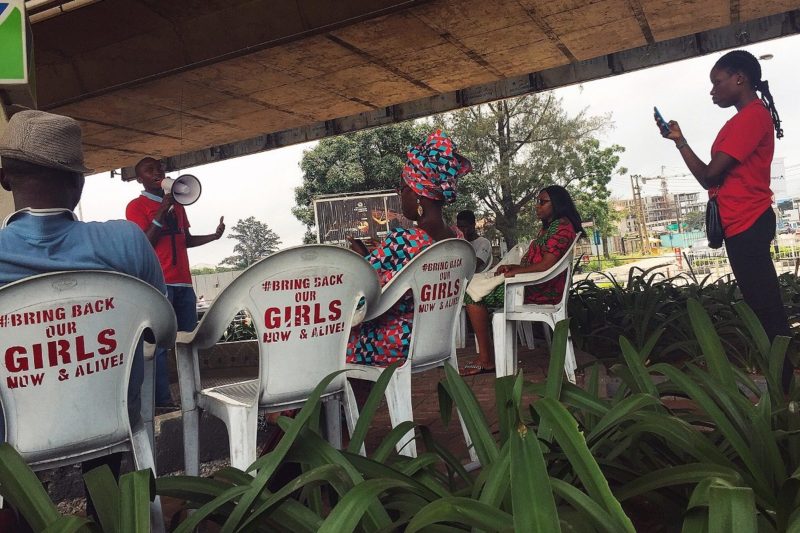Nigerian Activists Continue Push to #BringBackOurGirls Amid Increasing Boko Haram Violence
The Twitter campaign has ended, but sit-ins and weekly meetings have continued across Nigeria.

Despite government success in securing the release of some of the girls kidnapped by Boko Haram extremists, local activists say they will continue to protest until all the girls return home alive and well.
Boko Haram kidnapped nearly 300 girls from their school dormitory in the northeastern town of Chibok on the night of April 14, 2014. Fifty-seven girls escaped. In October last year, the terrorist group released 21 of the girls to the Nigerian government, reportedly in exchange for five Boko Haram members. Three girls rescued by the Nigerian army also returned home in the past year. And in May this year, 82 were freed in the largest release negotiated yet. But more than 100 girls remain in Boko Haram custody.
Yahi Batwa is father to one of the 82 girls that were freed.
“I am happy my daughter is free but not all that happy because we are still waiting for 113 girls still under Boko Haram’s captivity,” he told Rewire by phone from Lagos, as he prepared to travel to Abuja to meet his daughter and get more information about plans to rehabilitate the freed girls.
Batwa said his 20-year-old daughter Comfort, along with the other schoolgirls, went through ”scary trauma” as they endured starvation, beating, scorpion biting, and molestation for over three years. “They experienced so many difficulties,” he said. ”That’s why our heart is bleeding over others who remain in captivity.”
Meanwhile, local activists have continued to call for the release of the remaining girls. The hashtag campaign #BringBackOurGirls gained global attention and eventually became the name for their nationwide movement. The Twitter campaign has since ended, but sit-ins and weekly meetings have continued across Nigeria.
Last weekend, the Bring Back Our Girls movement gathered at a roundabout in Lagos as part of their weekly meetings. Everyone took turns holding a megaphone to register their resolve to continue pushing for the release of the girls.
”These Chibok girls must be brought back,” Habibat Balogun, one of the members of the movement, told the Saturday gathering. “But not just to bring them back physically, they must be brought back socially and psychologically. There’s no point bringing them back and their village is burnt and they cannot farm because bandits will come and kill, rape, and steal their food.”
Habibat Balogun reminded the gathering that the campaign to ensure the safe return of the abducted girls had since become a fight for the soul of Nigeria with humanity as the group’s core value.
Like Lagos, other cities play host to regular meetings of the Bring Back Our Girls movement. In Abuja, the Nigerian capital, the movement holds a daily sit-out at the Unity Fountain to keep the Chibok schoolgirls issue on the front burner.
They also want improved government accountability on security issues, particularly in the northeast where the Boko Haram insurgency has reportedly left more than 20,000 people dead since 2009, when the group, which is opposed to Western-style education, began a rebellion to impose its version of Sharia in Nigeria.
And the violence continues to claim lives.
Indeed, a few days before the Saturday meeting, Amnesty International released a statement highlighting Boko Haram’s increasing wave of violence.
According to Amnesty, nearly 400 civilians have died from Boko Haram attacks in five months since the start of April 2017, with casualties more than twice the previous five months’. Amnesty linked the sharp rise in civilian deaths to the armed group’s increased use of young suicide bombers, many of them girls.
“Boko Haram is once again committing war crimes on a huge scale, exemplified by the depravity of forcing young girls to carry explosives with the sole intention of killing as many people as they possibly can,” Alioune Tine, Amnesty International’s director for West and Central Africa, said in the statement.
“This wave of shocking Boko Haram violence, propelled by a sharp rise in suicide bombings, highlights the urgent need for protection and assistance for millions of civilians in the Lake Chad region. Governments in Nigeria, Cameroon and beyond must take swift action to protect them from this campaign of terror.”
The number of children used by the Boko Haram as “human bombs” has quadrupled this year, according to a recent report by UNICEF. The UN’s children agency said since the beginning of 2017, 83 children, most of them girls, have been used by the group to carry out bomb attacks in northeastern Nigeria—four times higher than in all of 2016.
Last December, Nigeria’s President Muhammadu Buhari, who vowed to defeat Boko Haram as part of his presidential campaign, announced that the last stronghold of Boko Haram in Sambisa Forest had been captured by the Nigerian military. Buhari said the army defeated Boko Haram following a months-long campaign focusing on the 500-square-mile forest.
But that seeming defeat appears to have come at a cost. “The displacement of Boko Haram fighters from the Sambisa Forest in Nigeria to the Mandara Mountains in Cameroon, following operations conducted by the Nigerian military, may explain some of the increase in attacks in Cameroon,” said Amnesty International.
“In Cameroon, Boko Haram have killed at least 158 civilians since April—four times more than in the preceding five months. The recent spike in casualties has been driven by increased suicide attacks, with 30—more than one per week—carried out since the beginning of April.”
Meanwhile, the bulk of casualties remain in Nigeria’s northeast, where Boko Haram attacks, according to Amnesty, have killed at least 223 civilians since April. The real figure, according to the human rights agency, may likely be higher with some deaths unreported.
